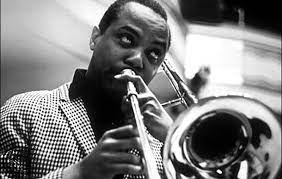Often referred to as the “Charlie Parker of the Trombone” , JJ Johnson dominated his instrument for more than 40 years becoming known for his stellar composition and instrumentation. Due to his unique musical dexterity and fluency he has been dubbed on of the best trombonists of all time.
Rise of JJ Johnson
James Louis “J.J.” Johnson’s experience for music began early on in his maturation. Between the ages 9 and 11, he studied piano in his family’s church organist, not picking up the trombone until the age of 14. Johnson became a professional musician in 1941, working in orchestra with Benny Carter and Count Basie. As JJ Johnson climbed the ranks of the jazz world, he was in great demand among jazz musicians and performed with many prominent jazz musicians such as Charlie Parker, Dizzy Gillespie, Miles Davis, and many others.

The Stylings of JJ Johnson
JJ Johnson became widely know for his dexterous style in his solos. Many listeners of his recording believed he was playing a valved trombone rather than a slide because of how fast he was able to move from note to note. During the time of bebop jazz, pioneered by Gillespie and Parker, many trombonists were left in the shadows due to the genres rapid-fire phrasing, complex harmonies, and offbeat rhythms. However, JJ Johnson defied the odds, assimilating the techniques of the bebop movement of the 1940s into his playing style.
JJ Johnson and Kai Winding
With the rise of bebop the trombone suffered a decline except for JJ Johnson and Kai Winding. Their early recordings showed how well they overcame the difficulties of adapting to the demands of the agile new music sound out of New York. The two later formed a very successful trombone partnership that was definitive of the modern history of the instrument.
Legacy of JJ Johnson
JJ Johnson redefined what it is to play the trombone with his career spanning over 40 years. He left a legacy in the jazz world through his skillful use of the slide trombone in bebop-style jazz and his hit compositions and arrangements.

